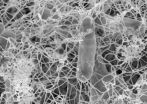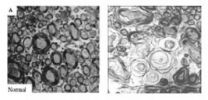(Press-News.org) Humans may have undergone a gradual rather than an abrupt transition from fishing, hunting and gathering to farming, according to a new study of ancient pottery.
Researchers at the University of York and the University of Bradford analysed cooking residues preserved in 133 ceramic vessels from the Western Baltic regions of Northern Europe to establish whether these residues were from terrestrial, marine or freshwater organisms.
The research led by Oliver Craig (York) and Carl Heron (Bradford) included an international team of archaeologists from The Heritage Agency of Denmark, The National Museum of Denmark, Moesgård Museum (Denmark), Christian-Albrechts-Universität, Kiel (Germany) and the Archäologisches Landesmuseum, Schleswig (Germany).
The project team studied ceramic pots from 15 sites dating to around 4,000 BC– the time when the first evidence of domesticated animals and plants was found in the region. The research, which was funded by the Arts and Humanities Research Council, is published online in the latest edition of the Proceedings of the National Academy of Sciences (PNAS).
The research team found that fish and other aquatic resources continued to be exploited after the advent of farming and domestication, with pots from coastal locations containing residues enriched in a form of carbon found in marine organisms.
Around one-fifth of coastal pots contained other biochemical traces of aquatic organisms, including fats and oils absent in terrestrial animals and plants. At inland sites, 28 percent of pots contained residues from aquatic organisms, which appeared to be from freshwater fish.
Lead author Dr Oliver Craig, of the Department of Archaeology at York, said: "This research provides clear evidence people across the Western Baltic continued to exploit marine and freshwater resources despite the arrival of domesticated animals and plants. Although farming was introduced rapidly across this region, it may not have caused such a dramatic shift from hunter-gatherer life as we previously thought."
Carl Heron, Professor of Archaeological Sciences at the University of Bradford, said: "Our data set represents the first large scale study combining a wide range of molecular evidence and single-compound isotope data to discriminate terrestrial, marine and freshwater resources processed in archaeological ceramics and it provides a template for future investigations into how people used pots in the past."
INFORMATION:
Ancient cooking pots reveal gradual transition to agriculture
2011-10-25
ELSE PRESS RELEASES FROM THIS DATE:
b-pack Announces Rehmann deploys b-pack Cloud Purchase-to-Pay solution to control its Procurement
2011-10-25
b-pack announces Rehmann recently chooses b-pack's Purchase-to-Pay Solution to implement their new Procurement and Asset Management strategy. The main objective is to quickly set up these functions with an Innovative On Demand solution.
One of the critical imperative of Rehmann was to bring visibility to their purchasing processes and also control their costs more efficiently. Selected in October 2011, b-pack was the best Purchase-to-Pay solution provider to implement Rehmann's new Procurement and Asset Management strategy.
Using b-pack, Rehmann is now able to track ...
Study offers clues as to why some patients get infections from cardiac implants
2011-10-25
COLUMBUS, Ohio – New research suggests that some patients develop a potentially deadly blood infection from their implanted cardiac devices because bacterial cells in their bodies have gene mutations that allow them to stick to the devices.
Patients with implants can develop infections because of a biofilm of persistent bacterial bugs on the surfaces of their devices. Researchers found that some strains of the bacteria, Staphylococcus aureus, have just a few genetic variants in the proteins on their surfaces that make them more likely to form these biofilms.
The research ...
With Employee-Wellness Programs and Green Initiatives, U.S. Chemicals Uses a Different Method for Chemical Distribution
2011-10-25
US Chemicals isn't your typical multi-million dollar chemical corporation. From a staff that's made up of roughly 80 percent women to corporate nutritionists to entryway waterfalls, the Darien, Conn. based company is really one-of-a-kind.
CEO Carol Piccaro, daughter of founder Howard T. Von Oehsen, wouldn't have it any other way.
"Corporate wellness is really important to me," Picarro explains. "Stress can kill you. We've tried to develop a different type of workplace here, and I think it really has a lot to do with wellness and performance and all ...
With Graeme Blackman Leading the Way, Inter-Marine Looks to Build its Own Name from the Renowned Inter-Chillers HVACR Brand
2011-10-25
Originally founded as Blackman Field Services in 1989, Inter-Chillers has since seen its name change, but its commitment to excellence in the field of Heating, Ventilation, Air Conditioning and Refrigeration (HVACR) continues to prosper throughout the reaches of Australia.
Based in Sydney and with an office in Melbourne, the company has extensive experience in the HVACR field, with over 800 years of accumulated knowledge in the industry. Graeme Blackman founded the company on the values of hard work and dedicated customer service, and those sentiments are clearly seen ...
Take your blood pressure meds before bed
2011-10-25
Patients who take at least one blood pressure-lowering medication at bedtime have better control of their blood pressure and are less likely to experience heart problems than patients who take medications in the morning
Sleep-time blood pressure is a better measure of heart health than wake-time blood pressure
About one out of three U.S. adults has high blood pressure
Washington, DC (Monday, October 24, 2011) — It's better to take blood pressure-lowering medications before bed rather than first thing in the morning, according to a study appearing in an upcoming issue ...
Patients who don't follow treatments hurt dialysis clinics' pay
2011-10-25
Patient characteristics affect whether dialysis clinics achieve treatment success and receive Medicare reimbursement
How well kidney disease patients follow their prescribed treatments has the greatest impact
Dialysis clinics in low-income urban areas provide care to more patients who don't follow their prescribed treatments; these clinics get unfairly penalized
Washington, DC (Monday, October 24, 2011) — Dialysis clinics that provide care to kidney disease patients who cannot or will not follow their prescribed treatments will be penalized under a new Medicare payment ...
Clues revealed to cause of deadly kidney disease in newborns
2011-10-25
Washington, DC -- Babies born with autosomal recessive polycystic kidney disease (ARPKD) often develop kidney failure because they have very large kidneys filled with tiny cysts. Even with excellent medical care, about 30% die shortly after birth. New research now provides clues into how gene defects may cause this condition, which occurs in 1 out of 20,000 newborns. The findings appear in an upcoming issue of the Journal of the American Society Nephrology (JASN), a publication of the American Society of Nephrology.
Mutations in a gene named PKHD1 cause ARPKD, but it's ...
Genetic difference in staph infects some heart devices, not others
2011-10-25
DURHAM, N.C. -- Infectious films of Staph bacteria around an implanted cardiac device, such as a pacemaker, often force a second surgery to replace the device at a cost of up to $100,000. But not all implanted cardiac devices become infected.
Now researchers from Duke University Medical Center and Ohio State University (OSU) have discovered how and why certain strains of Staphylococcus aureus (SA) bacteria, the leading cause of these device infections, have infected thousands of implanted cardiac devices. About 4 percent of the 1 million annually implanted devices become ...
Perinatal antidepressant stunts brain development in rats
2011-10-25
Rats exposed to an antidepressant just before and after birth showed substantial brain abnormalities and behaviors, in a study funded by the National Institutes of Health.
After receiving citalopram, a serotonin-selective reuptake inhibitor (SSRI), during this critical period, long-distance connections between the two hemispheres of the brain showed stunted growth and degeneration. The animals also became excessively fearful when faced with new situations and failed to play normally with peers – behaviors reminiscent of novelty avoidance and social impairments seen in ...
City of Kingston: Sustainability in Ontario
2011-10-25
In a report in Energy Digital, the City of Kingston explains that through a cooperation among City, community and business Kingston is on its way to becoming the most energy efficient municipality in Canada.
The City of Kingston is heavily focused on creating a more sustainable community. Through promotion of LEED construction, collaboration with community partners and the encouragement of renewable energy use, Kingston is already on its way to becoming the most sustainable municipality in Canada for generations to come.
The City of Kingston's green initiatives are ...


